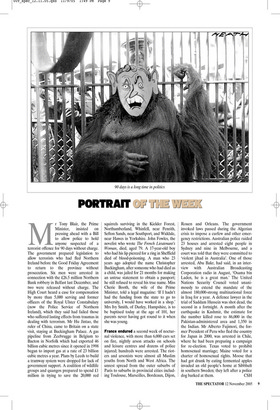PORTRAIT OF THE WEEK M r Tony Blair, the Prime Minister,
insisted on pressing ahead with a Bill to allow police to hold anyone suspected of a terrorist offence for 90 days without charge. The government prepared legislation to allow terrorists who had fled Northern Ireland before the Good Friday Agreement to return to the province without prosecution. Six men were arrested in connection with the £26.5 million Northern Bank robbery in Belfast last December, and two were released without charge. The High Court heard a case for compensation by more than 5,000 serving and former officers of the Royal Ulster Constabulary (now the Police Service of Northern Ireland), which they said had failed those who suffered lasting effects from traumas in dealing with terrorism. Mr Hu Jintao, the ruler of China, came to Britain on a state visit, staying at Buckingham Palace. A gas pipeline from Zeebrugge in Belgium to Bacton in Norfolk which had exported 46 billion cubic metres since it opened in 1998 began to import gas at a rate of 23 billion cubic metres a year. Plans by Leeds to build a tramway system were dropped for lack of government support. A coalition of wildlife groups and quangos prepared to spend £1 million in trying to save the 20,000 red squirrels surviving in the Kielder Forest, Northumberland, Whinfell, near Penrith, Sefton Sands, near Southport, and Widdale, near Hawes in Yorkshire. John Fowles, the novelist who wrote The French Lieutenant’s Woman, died, aged 79. A 17-year-old boy who had his lip pierced for a ring in Sheffield died of blood-poisoning. A man who 23 years ago adopted the name Christopher Buckingham, after someone who had died as a child, was jailed for 21 months for making an untrue statement to obtain a passport; he still refused to reveal his true name. Miss Cherie Booth, the wife of the Prime Minister, told a legal magazine: ‘If I hadn’t had the funding from the state to go to university, I would have worked in a shop.’ Mrs Ivy Smith, of Durley, Hampshire, is to be baptised today at the age of 101, her parents never having got round to it when she was young.
France endured a second week of nocturnal violence, with more than 6,000 cars set on fire, nightly arson attacks on schools and leisure centres and dozens of police injured; hundreds were arrested. The rioters and arsonists were almost all Muslim youths from North and West Africa. The unrest spread from the outer suburbs of Paris to suburbs in provincial cities including Toulouse, Marseilles, Bordeaux, Dijon, Rouen and Orleans. The government invoked laws passed during the Algerian crisis to impose a curfew and other emergency restrictions. Australian police raided 23 houses and arrested eight people in Sydney and nine in Melbourne, and a court was told that they were committed to ‘violent jihad in Australia’. One of those arrested, Abu Bakr, had said, in an interview with Australian Broadcasting Corporation radio in August, ‘Osama bin Laden, he is a great man.’ The United Nations Security Council voted unanimously to extend the mandate of the almost 180,000-strong multinational force in Iraq for a year. A defence lawyer in the trial of Saddam Hussein was shot dead, the second in a fortnight. A month after the earthquake in Kashmir, the estimate for the number killed rose to 86,000 in the Pakistan-administered area and 1,350 in the Indian. Mr Alberto Fujimori, the former President of Peru who fled the country for Japan in 2000, was arrested in Chile, where he had been preparing a campaign for re-election. Texas voted to prohibit homosexual marriage; Maine voted for a charter of homosexual rights. Moose that had got drunk by eating fermented apples invaded an old people’s home at Sibbhult in southern Sweden; they left after a police dog barked at them. CSH



























































 Previous page
Previous page